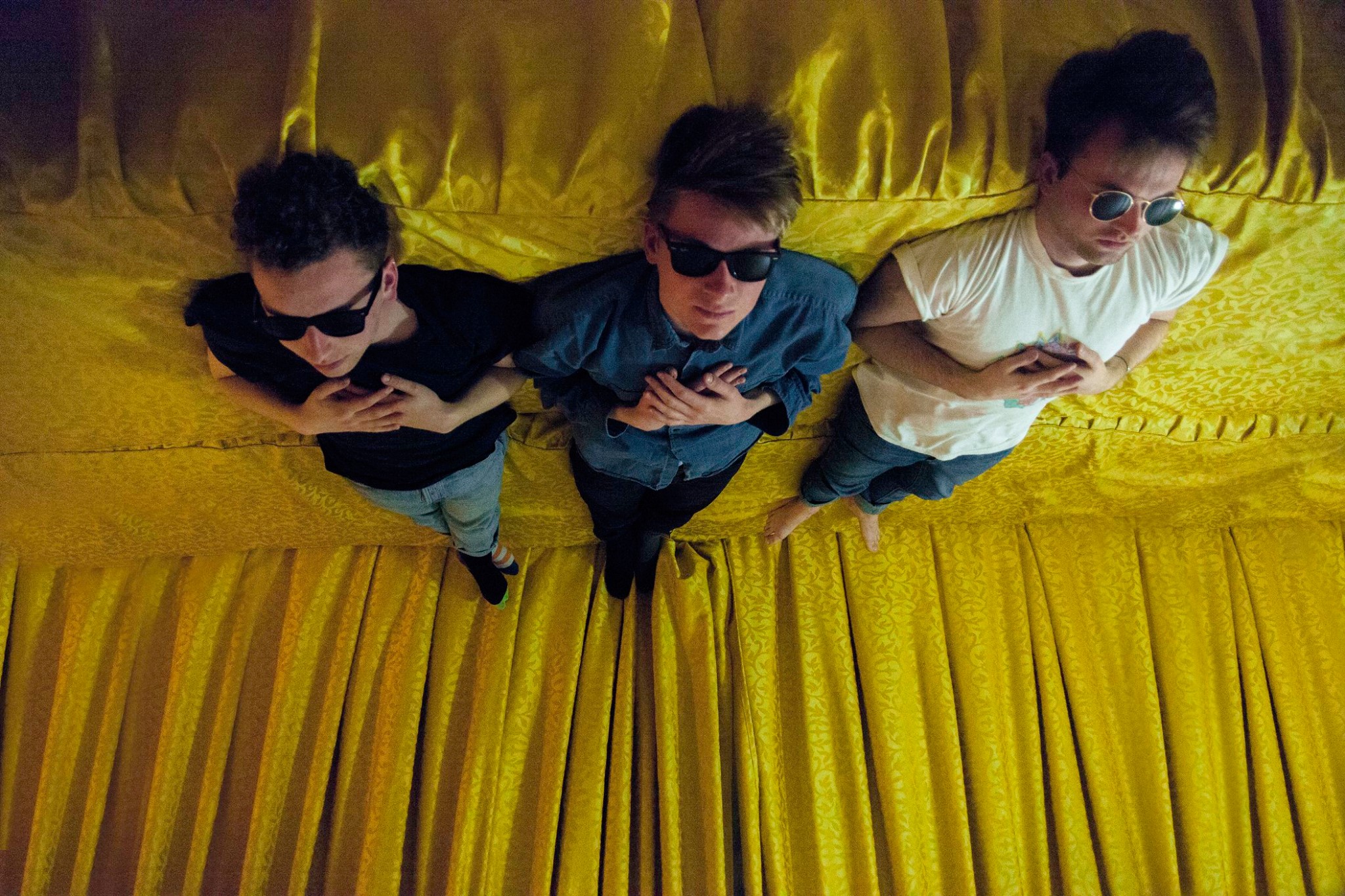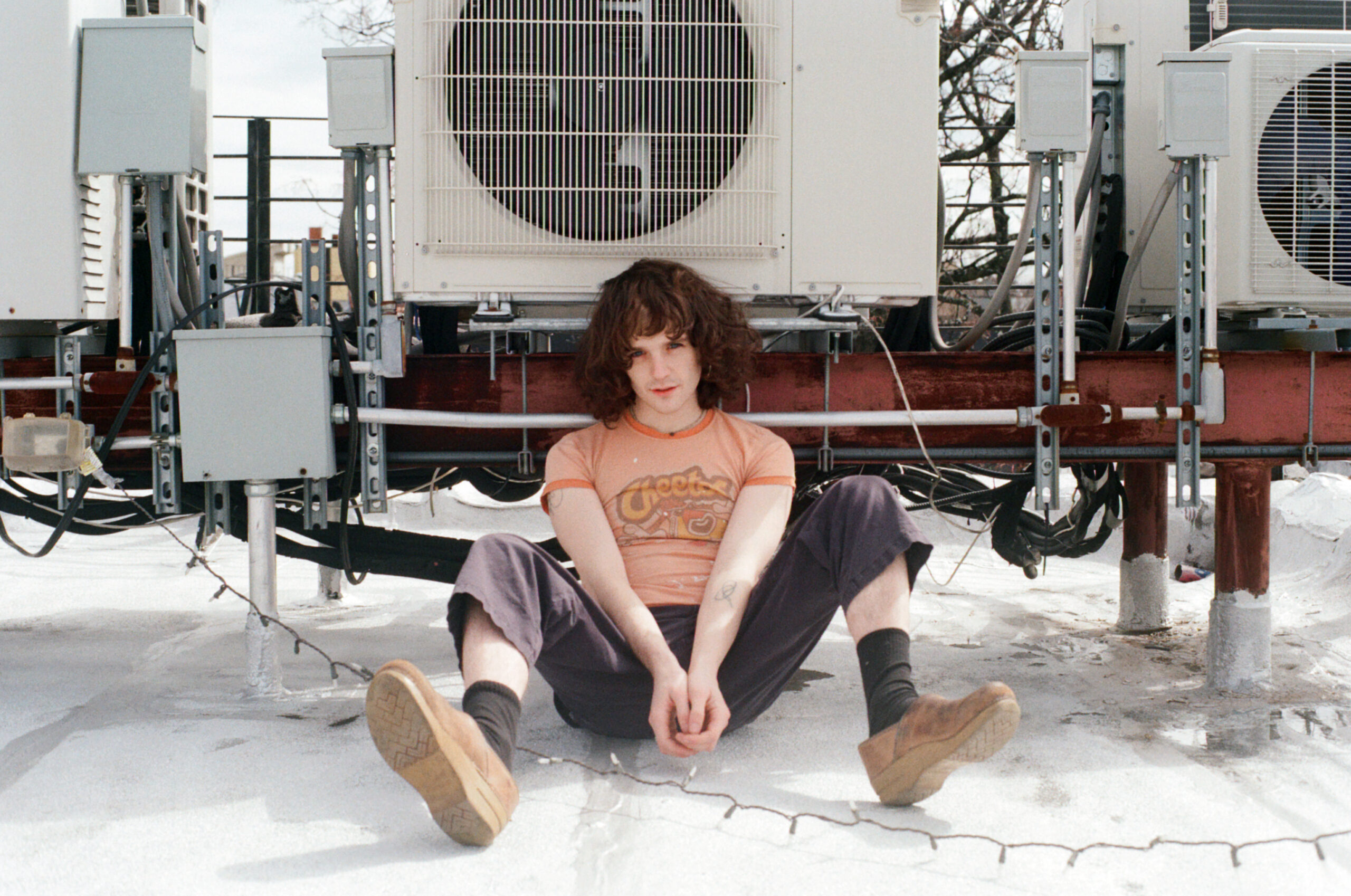Happiness is a great feeling; Happyness is a great band. The South London trio specializes in lush-yet-breezy indie rock that conjures all sorts of wistful feelings then takes the piss out of them with wry puns and punchlines. Think of it as Sparklehorse's mournful dream-pop pocket symphonies infused with Pavement's winking ironic sensibility, or Yo La Tengo if their public sense of humor seeped into their records more often. It's gorgeous, gregarious stuff, music that immediately ingratiates itself but continues to reveal new layers of beauty with time.
Debut album Weird Little Birthday, due out next week on the heels of January's fine self-titled EP, positions Happyness as one of the finest new bands on the face of this Earth. The artistry of the music they're making would be reason enough to familiarize yourself; be it the splendor of a twilight landscape, the intimacy of a night huddled on the couch in front of the TV, or the awkward energy of being an introvert at a buzzing party, Happyness can capture it with effortless grace. But when you notice that opening song "Baby, Jesus (Jelly Boy)" includes the lyric "I'm the motherfucking birthday boy/ Don't steal my thunder, baby Jesus," that's when you realize this is a special band.
Singer-guitarist Benji Compston, bassist Jonny Allan, and drummer Ash Cooper spoke by Skype recently about laughing at yourself before other people do, growing out of their Libertines phase, and their general obliviousness with regard to Will Smith.
STEREOGUM: How did you guys become a band?
BENJI COMPSTON: We've known each other for about five or six years now. We were in a few bands together when we were teenagers. It was invariably kind of British mid-noughties indie straight down the line. It had that Libertines influence. And it got to the point that we were pretty much the only three people still going, mainly because we three just had this kind of -- the way that we approach music just seemed to simply fit together. It was a bit of a no-brainer.
ASH COOPER: We really like the same kind of bands and the same music for a while and shared bands and influences with each other for a while, long before this happened.
JONNY ALLAN: For a very long time we didn't actually have a band name. We were just writing songs, and we had this studio in South London in a place called Bermondsey, and we would just go there every Saturday. We worked during the week, and every Saturday we would end up under this railway and go all night. We'd probably get there about 10 in the evening and just go kind of jam stuff out and write music. And after about six months we realized we were most of the way to making an album.
STEREOGUM: So all that time you still didn't have a band name?
COMPSTON: We tried a few out.
ALLAN: Mainly just because we wanted to play some shows and try stuff live. We had to think up our name so that people could it put it on the flyers.
COMPSTON: We were Haemoglobin at one point. We called ourselves Heavy Lid for a little bit after that one.
STEREOGUM: How did you settle on Happyness? Especially the Will-Smith-preferred spelling?
ALLAN: Curse Will Smith! Yeah, we had absolutely no idea that the Will Smith movie was a thing.
COMPSTON: None of us have actually seen The Pursuit Of Happyness. So we weren't thinking, like, "Oh yeah, great band name" being influenced by that movie. It's more like, "No, no, no." But I guess the spelling -- I don't know, it takes a bit of the gravity out of the word. We like to hear it ring "happiness" but seeing it written without changing the spelling and having a "y," having it with an "i" it looked a little too ironic, a little too coy.
STEREOGUM: One thing I noticed about the album is there's kind of a sick sense of humor in the songs. Songs with the musical palette you guys use always seem to take themselves very seriously. Is it fair to say there's a lot of humor going on?
ALLAN: We wanted it to be like a wry smile, not angsty or too self-indulgent.
COMPSTON: Also, it's 2014. Sometimes you've got to slightly acknowledge that people aren't going to take you 100 percent seriously. You've got to laugh at yourself or otherwise people are going to do it for you.
COOPER: The more serious parts of the album, I think they come across better because of the sense of humor. It actually affects you more -- or at least we found it that it went better with a little humor injected into it as opposed to just being like, "Here you go."
COMPSTON: And we never want to sound preachy. That's really not our thing.
STEREOGUM: The first single was "Great Minds Think Alike, All Brains Taste The Same." Is that a zombie song?
COMPSTON: I wish! I wish that was a zombie song. I remember Jonny said that line and I thought, "That's brilliant. I've got to get it into a song."
ALLAN: That happens. Somebody will say something, and they won't think anything of it, and then a week later someone else will have put it in a song.
COMPSTON: Also, we went through a period during the album when we couldn't record super-late because there was a 93-year-old woman right next door to the studio. And even though I don't think her hearing's amazing, we didn't want to take the piss. And we got along very well. So we'd watch quite a lot of movies, and we went through this phase of watching all the Hannibal Lecter films. And regrettably, the worse they got as films, the more we enjoyed them -- the really bad, hilariously bad films.
ALLAN: The ones with the tacky violence.
STEREOGUM: I understand "Leave The Party" is about shooting up a party?
COMPSTON: That song was never meant to be a particularly violent song at all. It was just kind of a song about making peace. I just couldn't help myself tacking that thing on the end anyway. I guess we watch a lot of movies. It's kind of the same thing. Like if you watch violence in a movies, it's not us condoning violence in real life. It's all a bit of a construct.
COOPER: And everybody has had that feeling, like "I hate that guy. I could just let go."
STEREOGUM: You mentioned that your old bands were influenced by the British rock scene, but your new album sounds heavily influenced by American indie rock. At what point did you head in that direction? And was it a conscious thing?
ALLAN: Actually, it was a matter of getting to the point where we were in a band that would let us do that. When we were teenagers, one of us would be trying to do something, and then because there'd be another member who didn't have the same vision as us -- a lot of it was set up like, "Oh, we're friends, we should be in a band!" rather than "We've got this idea of what the band should be, let's make it happen."
COMPSTON: Sparklehorse is one that really changed our outlook on the recording process in particular and the image we wanted our band to put across.
ALLAN: He was the first person that we heard that was making something that we really loved. And it was kind of like, "Why don't we just do that?"
COMPSTON: It's kind of happy when you get to a point where you get to a point where you have a choice to do your own thing and it's like...
COOPER: ...you have nothing to lose.
Weird Little Birthday is out 6/16 on Weird Smiling. Stream it here, and check Happyness out on tour in the UK next week:
06/16 London @ Rough Trade West
06/17 London, UK @ Servant Jazz Quarter
06/18 Sunderland, UK @ Sunderland Pop Store
06/19 Glasgow, UK @ Teenage Riot, Bloc
06/20 Manchester, UK @ The Castle Hotel
06/21 Leeds, UK @ Brudenell






